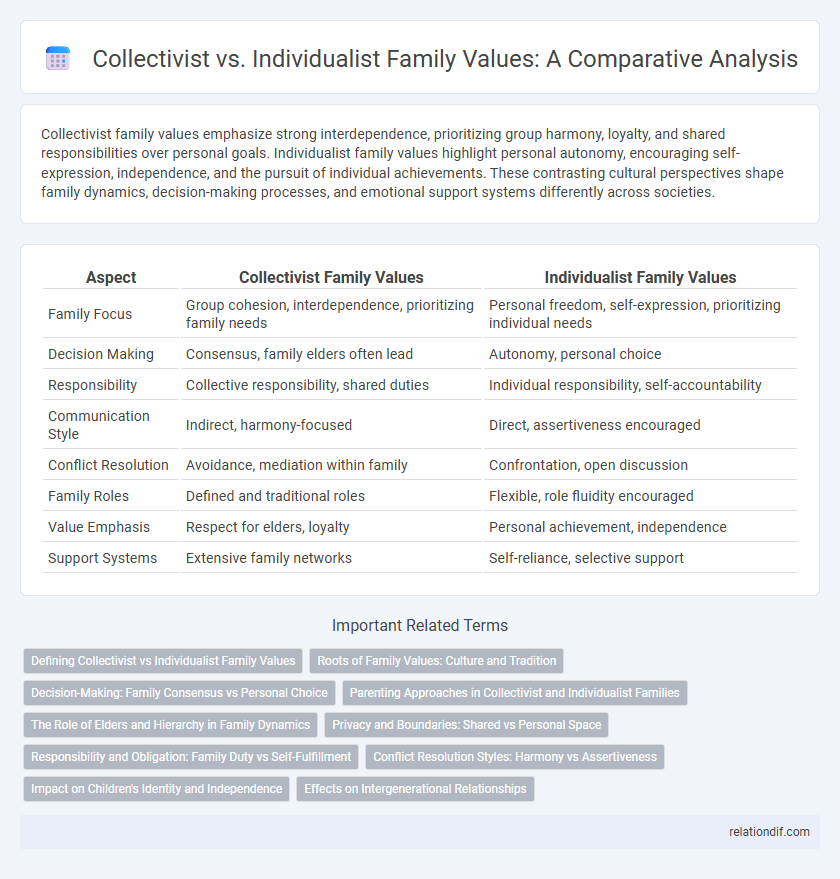Collectivist family values emphasize strong interdependence, prioritizing group harmony, loyalty, and shared responsibilities over personal goals. Individualist family values highlight personal autonomy, encouraging self-expression, independence, and the pursuit of individual achievements. These contrasting cultural perspectives shape family dynamics, decision-making processes, and emotional support systems differently across societies.
Table of Comparison
| Aspect | Collectivist Family Values | Individualist Family Values |
|---|---|---|
| Family Focus | Group cohesion, interdependence, prioritizing family needs | Personal freedom, self-expression, prioritizing individual needs |
| Decision Making | Consensus, family elders often lead | Autonomy, personal choice |
| Responsibility | Collective responsibility, shared duties | Individual responsibility, self-accountability |
| Communication Style | Indirect, harmony-focused | Direct, assertiveness encouraged |
| Conflict Resolution | Avoidance, mediation within family | Confrontation, open discussion |
| Family Roles | Defined and traditional roles | Flexible, role fluidity encouraged |
| Value Emphasis | Respect for elders, loyalty | Personal achievement, independence |
| Support Systems | Extensive family networks | Self-reliance, selective support |
Defining Collectivist vs Individualist Family Values
Collectivist family values emphasize interdependence, prioritizing family unity, harmony, and shared responsibilities, common in cultures like those of East Asia and Latin America. Individualist family values focus on personal autonomy, self-expression, and individual rights, often seen in Western societies such as the United States and Western Europe. These contrasting values shape family dynamics, decision-making processes, and the balance between personal goals and collective well-being.
Roots of Family Values: Culture and Tradition
Collectivist family values emphasize interdependence, prioritizing group harmony, loyalty, and shared responsibilities rooted deeply in cultural traditions and community practices. Individualist family values focus on personal autonomy, self-expression, and independence, reflecting cultural shifts toward personal freedom and individual rights. The roots of family values are shaped by historical, cultural, and social contexts, influencing how families balance collective well-being with individual goals.
Decision-Making: Family Consensus vs Personal Choice
Collectivist family values emphasize decision-making through family consensus, prioritizing harmony, shared responsibilities, and interdependence among members. In contrast, individualist family values support personal choice, encouraging autonomy and self-expression in making decisions. Research shows collectivist cultures often resolve conflicts collaboratively, while individualist cultures promote independent problem-solving.
Parenting Approaches in Collectivist and Individualist Families
Parenting approaches in collectivist families emphasize interdependence, obedience, and family cohesion, with children often expected to prioritize group harmony and respect for elders. In contrast, individualist families encourage autonomy, self-expression, and personal goals, fostering independence and critical thinking in children. These differing values shape distinct disciplinary styles, communication patterns, and emotional expectations within the family unit.
The Role of Elders and Hierarchy in Family Dynamics
In collectivist family values, elders hold a central and respected role, serving as the primary decision-makers and moral guides within the family hierarchy. This structure emphasizes obedience, interdependence, and the preservation of family honor, where younger members prioritize the needs and wisdom of their elders. In contrast, individualist family values promote equality and self-expression, reducing hierarchical influence and encouraging younger members to assert independence and personal goals within family dynamics.
Privacy and Boundaries: Shared vs Personal Space
Collectivist family values emphasize shared spaces where privacy is often secondary to group harmony, promoting close-knit interactions and communal living arrangements. Individualist family values prioritize personal space and clear boundaries, fostering independence and respect for privacy within the household. Cultural contexts shape these approaches, affecting communication styles, conflict resolution, and daily routines in family life.
Responsibility and Obligation: Family Duty vs Self-Fulfillment
Collectivist family values emphasize responsibility and obligation toward family duty, prioritizing the needs and harmony of the family group over individual desires. In contrast, individualist family values highlight self-fulfillment and personal autonomy, encouraging members to pursue their own goals and define success independently. The tension between these perspectives shapes diverse family dynamics, influencing decision-making, support systems, and intergenerational expectations.
Conflict Resolution Styles: Harmony vs Assertiveness
Collectivist family values emphasize harmony and prioritizing group cohesion during conflict resolution, often encouraging indirect communication and compromise to maintain relationships. In contrast, individualist family values promote assertiveness, supporting open expression of personal viewpoints and direct negotiation to resolve conflicts while respecting individual autonomy. These differing approaches reflect underlying cultural priorities between preserving unity and fostering independence within family dynamics.
Impact on Children's Identity and Independence
Collectivist family values emphasize interdependence, promoting children's strong sense of belonging and shared identity within the family unit, often resulting in heightened social cohesion and respect for familial roles. Individualist family values prioritize personal autonomy, encouraging children to develop independent decision-making skills and a unique sense of self that may enhance self-confidence and personal aspirations. The contrast between these value systems shapes children's identity formation and independence, influencing their social behavior and psychological development across diverse cultural contexts.
Effects on Intergenerational Relationships
Collectivist family values emphasize strong intergenerational bonds through shared responsibilities and mutual support, fostering respect and caregiving between elders and youth. Individualist family values prioritize personal autonomy and independence, which can lead to looser intergenerational ties and increased emotional distance. These differing value systems significantly shape communication patterns, caregiving roles, and conflict resolution within multigenerational households.
Collectivist family values vs Individualist family values Infographic

 relationdif.com
relationdif.com